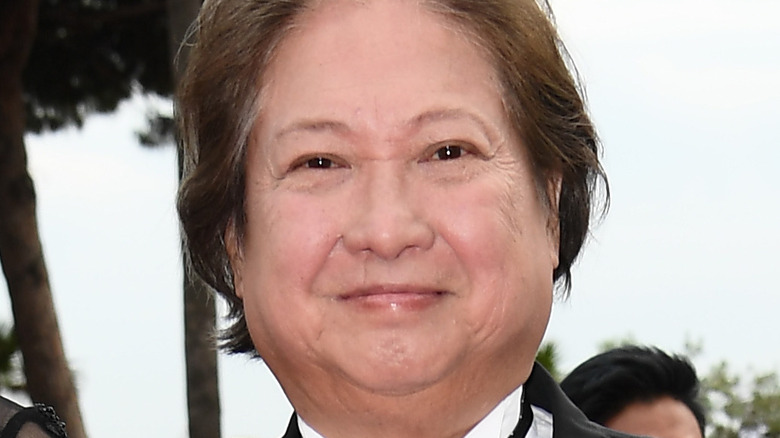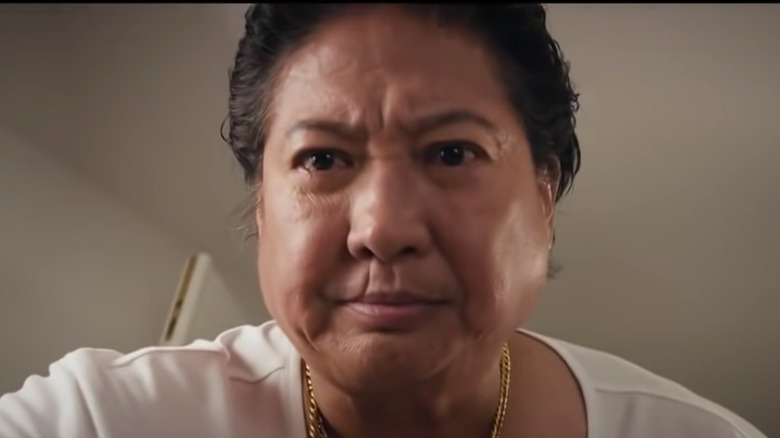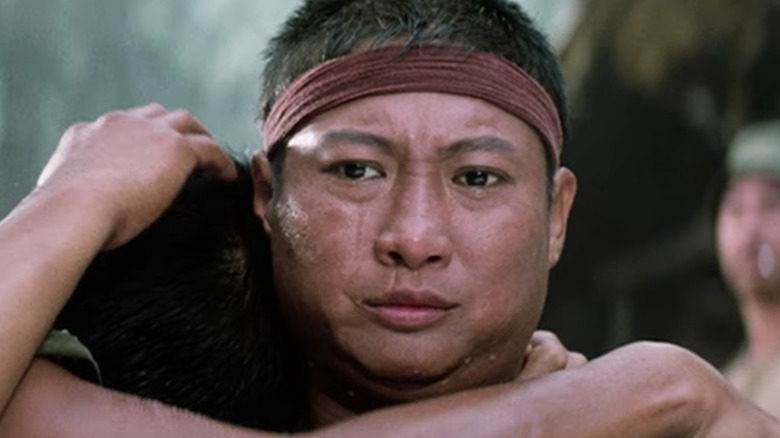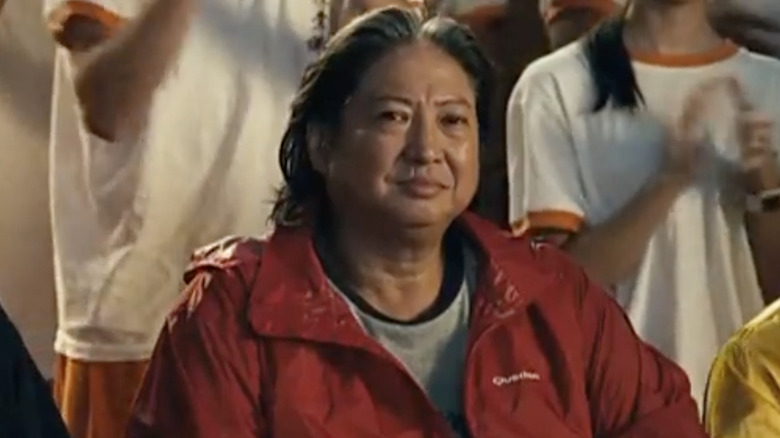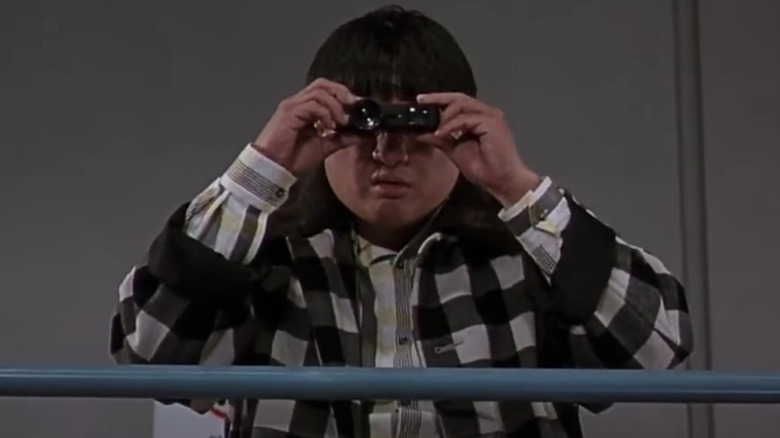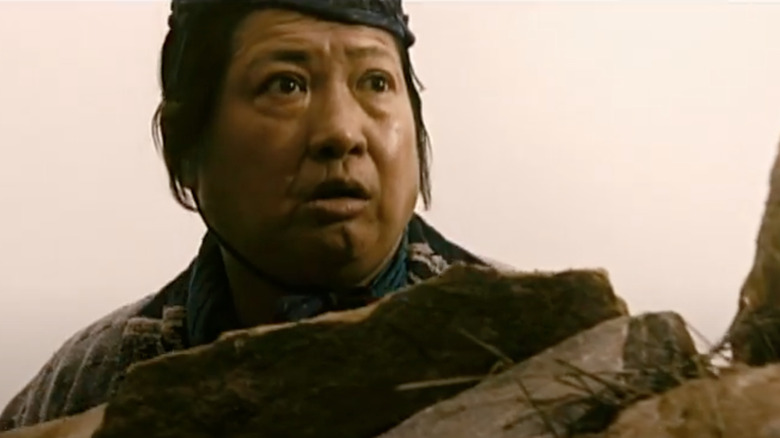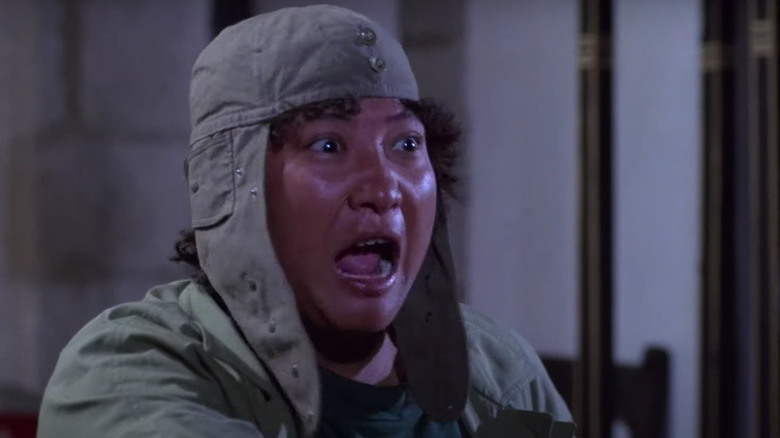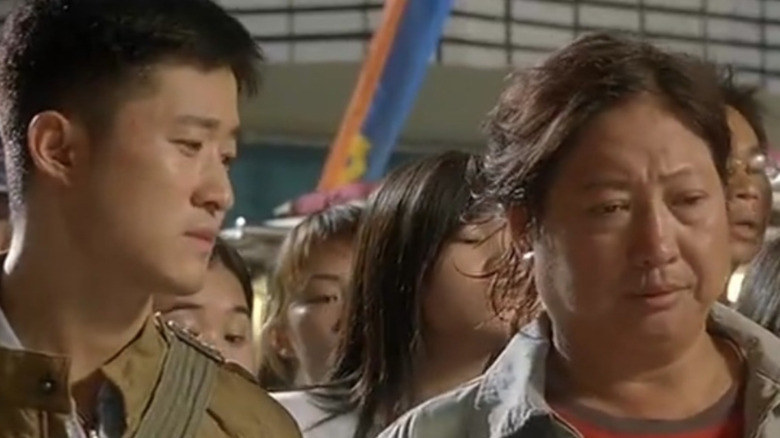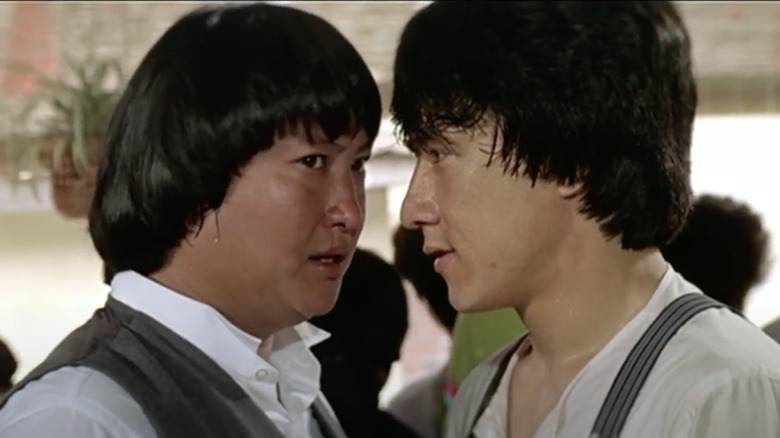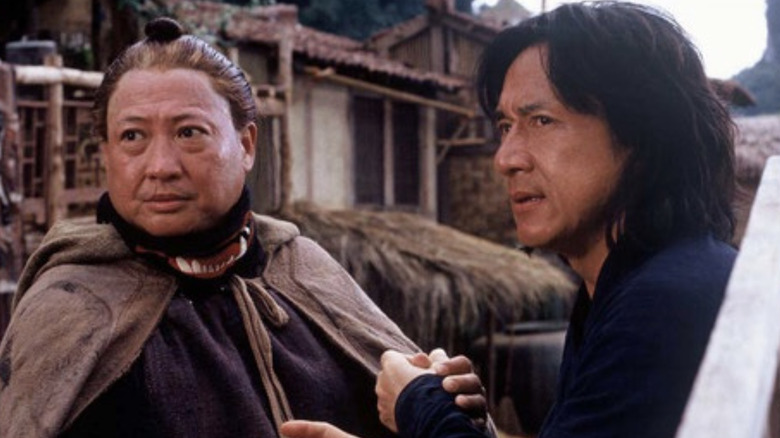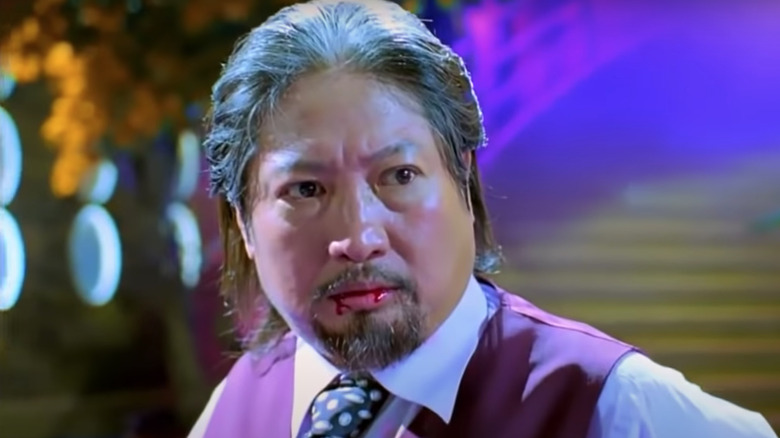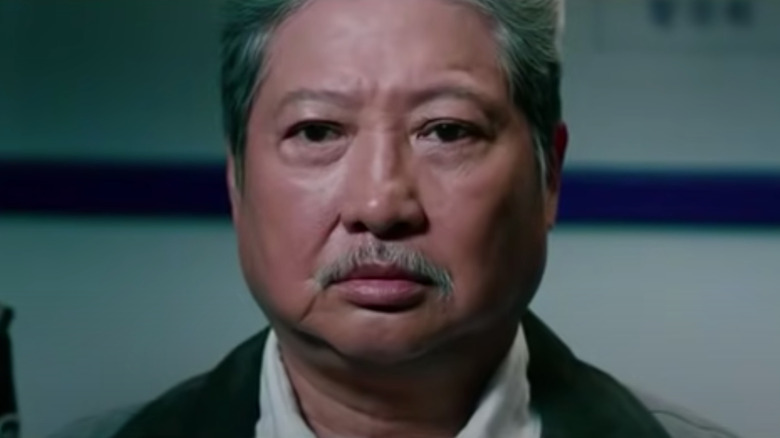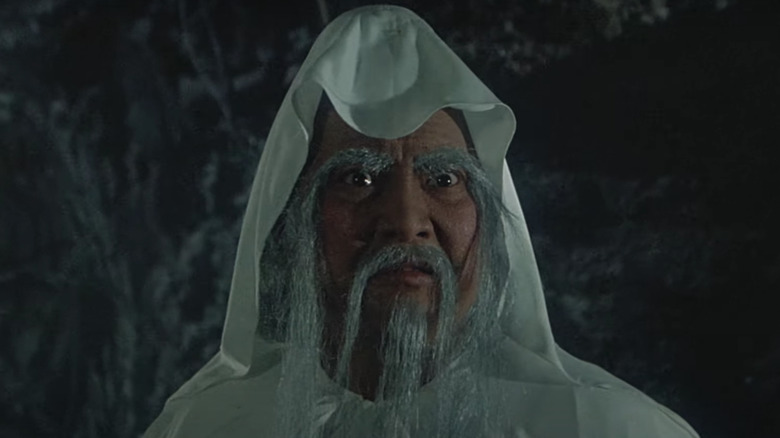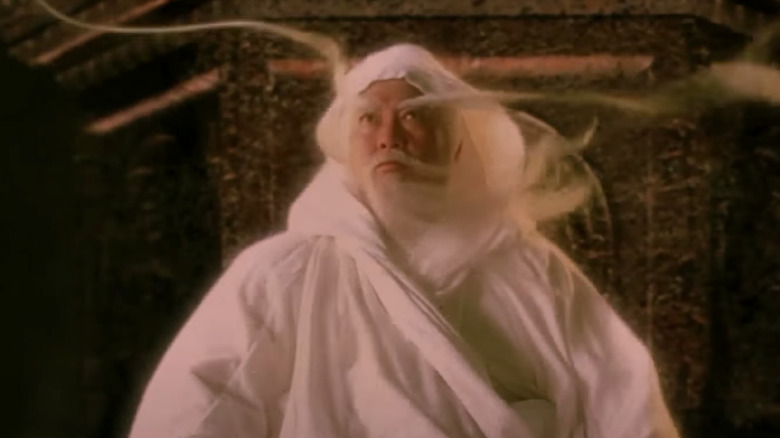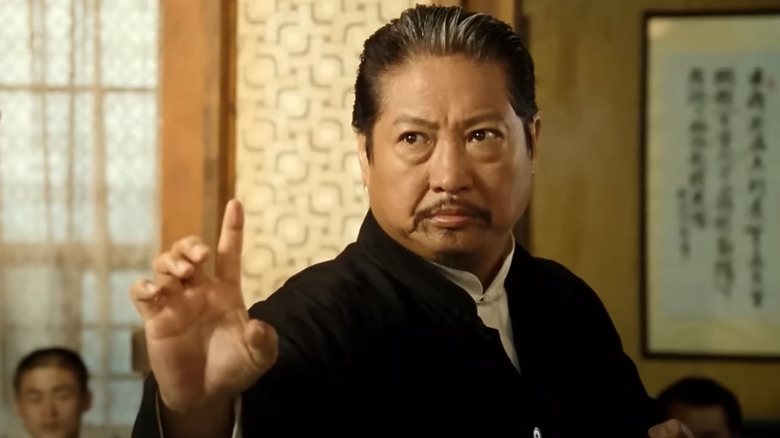The 7 Best And 7 Worst Sammo Hung Movies Ranked
Sammo Hung, who also goes by Sammo Kam-bo Hung, is a world-class martial artist and actor. He is an incredibly important figure in the world of action filmmaking. He has worked behind the camera as well and has served as the director, production, stunt coordinator, fight choreographer, and action director of dozens of films from the late 1960s to the present day.
He is credited with leading the charge in revitalizing the action film industry in the 1980s as he helped usher in the Hong Kong New Wave, and he proved vital in helping up-and-coming new talent break into the film industry, including massive stars like Michelle Yeoh and Jackie Chan. In fact, Hung is often referred to as "Dai Goh Dai," which translates to "biggest brother."
Though he never shared the typically lean body type of his martial-arts contemporaries, Sammo Hung used his added weight to his advantage and was just as athletic and physically impressive in action sequences as anyone else in the Hong Kong film industry. Hung's filmography is vast, and he has appeared in over 200 movies and television shows. If you're in the mood for one of Sammo Hung's movies, it's best to know which movies to seek out and which ones to avoid at all costs.
Worst: Naked Soldier
"Naked Soldier" is a 2012 action thriller that performed extremely poorly at the Hong Kong box office and had very little reach beyond its home country. "Naked Soldier" is a spiritual successor to movies like "Naked Killer," "Naked Killer 2," and "Naked Weapon," all of which center around highly sexualized women who are forced into serving as assassins for villainous plots. All of the "Naked" movies were written by the incredibly prolific Jing Wong, who is the screenwriter of over 200 movies in just 44 years.
The lead brain-washed assassin role was played by Jennifer Tse, who has only acted in a couple of movies and is better known as a successful fashion model. She does have a strong connection to the film industry, however, as her older brother is Nicholas Tse, who is well-versed in Hong Kong action filmmaking. Sammo Hung shares a co-lead role as Jennifer Tse's father, a police officer who is trying to find and rescue her after she was abducted and forced into the life of an assassin.
While none of the "Naked" assassin movies were ever aiming to be anything more than sleazy entertainment, "Naked Soldier" is unlikely to even satisfy its core fanbase. According to Asian Movie Pulse, fans who are expecting naked women and sleaze will be disappointed by this film. What the film does offer, however, is humor.
Best: Eastern Condors
"Eastern Condors" is an action film from 1987 that fuses the martial arts and war genres together. The film is set during the Vietnam war and centers around a group of men from different Asian countries who are held as convicts in an American prison. To earn their freedom, these prisoners are sent to war-torn Vietnam on a secret mission to find a lost missile cache left behind by the U.S. military and destroy it before it can be used by the Vietnamese opposition.
Heading up this group of prisoners is Sammo Hung, who also directed the film in addition to starring in it. Co-starring with Sammo Hung was frequent collaborator Yuen Biao. The cast also includes Yuen Woo-Ping and Corey Yuen, who both earned reputations as two of the best directors and action choreographers in all of martial-arts cinema.
Martial artists Billy Chow, Dick Wei, and Wah Yuen make up some of the toughest opponents faced by the team of prisoners, with the latter playing the main villain, a Vietcong general who can't stop giggling as he fights.
"Eastern Condors" is a classic of the genre and finds Sammo Hung operating at his prime. Critic Panos Kotzathanasis of Asian Movie Pulse writes that the film is a paragon of the martial arts/action genre and that it's one of the best Sammo Hung movies out there.
Worst: Fight the Fight
"Fight the Fight" is also known as "Speed of Light" and "Choy Li Fut," which is the name of a particular martial-arts fighting style that originated in the early 1800s. The story follows a fighter who trains at his father's martial-arts school, which is in danger of being sold, and eventually competes in a high-stakes martial arts tournament. The simplistic and familiar plot is extremely straightforward and brings virtually nothing to the table of any substance, and the fight scenes are lacking in complexity.
The film suffers from being a bit of a vanity project for lead actor Tin-Chiu Hung, who doesn't just play Sammo Hung's son on screen but is also his son in real life. Director Huang Mingsheng and Sammo Hung both hoped to use "Fight the Fight" to turn Tin-Chiu Hung into "the second Donnie Yen," going as far as to present his fighting style as similar to Yen's, as reported by Chinese news outlet Sina. This goal wasn't quite met as "Fight the Fight" didn't leave a positive impression, and Tin-Chiu Hung has only appeared in a few movies in the decade since then, typically in supporting roles.
Best: Dragons Forever
"Dragons Forever" was the final film that starred the iconic trio of Jackie Chan, Sammo Hung, and Yuen Biao, collectively known as the Three Dragons. Their reputation as the Three Dragons tied directly into the film's title, though it also frequently goes under the name "Cyclone Z." The trio play a team of high-power attorneys hired by a chemical plant to protect their reputation and defend them from environmental activists so they can continue their egregious polluting ways unhindered. The three do as instructed at first but are eventually swayed to the environmentalists' side by a change in morals and the lure of romance.
The film is packed with both action and comedy, and all three leads are given their moments to shine. On the opposition, Dick Wei, Wah Yuen, and Benny "The Jet" Urquidez make for extremely memorable villains. Benny "The Jet" Urquidez was the real-life kickboxing champion of the world six times in five different weight classes, and his one-on-one fight against Jackie Chan is the action highlight of the film and one of the best fight scenes in the entirety of Chan's endlessly impressive filmography. Their fight holds additional significance as the two had earlier fought on screen in the previous Three Dragons movie, "Wheels on Meals."
Worst: Three Kingdoms
"Three Kingdoms," which is also known by the elongated title "Three Kingdoms: Resurrection of the Dragon," is a historical epic released in 2008. The film is set in A.D. 228 as a civil war ravages China. Andy Lau stars as an average citizen who joins the military and eventually rises to become a respected and feared general with the power to turn the tide of war. Sammo Hung plays his friend and fellow soldier who fights alongside him but grows jealous as he continues to be promoted. The other most notable name on the cast is Maggie Q in a villain role as a key commander for the enemy army.
The story was adapted from parts of "The Romance of the Three Kingdoms," a 14th-century epic that is one of the crucial pieces of Chinese literature, according to Variety. With such important source material and a $20 million budget behind it, there was a lot riding on "Three Kingdoms." The film just barely managed to earn back its production budget at the international box office, as most western viewers were none too impressed. Film critic Maggie Lee with The Hollywood Reporter walked away disappointed and wrote that the film's exploration of key historical events does not engage its viewers. Lee also criticizes some of the casting choices, the music, and aspects of the cinematography, such as the battle scenes and other shots.
Best: Wheels on Meals
As a follow-up to the massive success of "Project A" in 1983, the trio of Jackie Chan, Sammo Hung, and Yuen Biao reunited the following year for 1984's "Wheels on Meals." The title, which doesn't make much sense in English, was originally supposed to be "Meals on Wheels" in reference to the food truck run by the main characters but, supposedly, the title was switched out due to box-office superstition.
The film is set in Spain, where Jackie Chan and Yuen Biao play cousins who run a food truck. Sammo Hung plays a private investigator who enlists their help when he is hired to protect a woman from gangsters, and she ends up going missing. Goya-Award-winning Spanish actor José Sancho plays the main villain, and his top henchman is portrayed by world kickboxing champion Benny "The Jet" Urquidez. The showstopper fight scene between Jackie Chan and Benny "The Jet" is legendary amongst kung fu fans, and Jackie Chan himself named it as one of his best fight scenes in his autobiography "I Am Jackie Chan: My Life in Action," writing that "The Jet" Urquidez really tested his skills and pushed them to the limit.
Worst: Twins Mission
"Twins Mission" is a fantasy action movie from 2007. The twins are played by Charlene Choi and Gillian Chung, who are not twins in real life but are the two members of a popular Cantopop music duo known as "Twins."
The duo has acted together in dozens of projects, including in two earlier "Twins" movies: "The Twins Effect" with Jackie Chan and "The Twins Effect II" with Chan and Donnie yen. Though the three "Twins" movies share a lot in common, the stories are unrelated, and the titular duo plays different characters in the different movies.
The story of "Twins Mission" finds the titular duo playing trapeze artists who are tasked with recovering a mystical Tibetan bead that has supernatural healing powers after it falls into the hands of supervillains who plan to use it for evil. Sammo Hung and Wu Jing play the pair of monks who initially possessed the bead before it gets stolen.
The plot devolves into a convoluted jumble with more and more pairs of twins getting introduced to the story as it is revealed that there is an entire guild of thieves comprised only of sets of twins who operate in tandem. Much of the plot is total nonsense.
The Asian Cinema Critic gave the movie a poor review and compared it unfavorably to the other "Twins" movies, describing "Twins Mission" as being even more difficult to follow, asserting that the overall film actually feels like it has gone nuts.
Best: Project A
"Project A" is the highest-rated on-screen collaboration between frequent coworkers Sammo Hung and Jackie Chan. It was the first movie made in the Three Dragons Trilogy, which includes three disconnected stories that all starred the trio of Sammo Hung, Jackie Chan, and Yuen Biao. The three had all grown up together in the Peking opera school, and each had made their way into the Hong Kong film industry. In addition to co-starring together, Jackie Chan and Sammo Hung also choreographed the action and co-directed the film together.
The film is an action-comedy period piece set in the 19th century. This time around, the three lead characters all come from different backgrounds (Jackie Chan is in the navy, Yuen Biao is on the police force, and Sammo Hung operates as a street-level thief) and begin as adversaries before teaming up to defeat a greater enemy: A band of pirates led by Dick Wei. "Project A" is packed with exciting fight scenes that utilize all three leads to the fullest and feature some of Jackie Chan's most death-defying stunt work, most famously the 25-meter (7.5 stories) clock tower drop that left Chan with cervical spine damage. According to Asian Movie Pulse, "Project A" is Chan's best movie and fans agree.
Worst: Around the World in 80 Days
"Around the World in 80 Days" is the only collaboration between Jackie Chan and Sammo Hung that is downright bad. It is also their only collaboration made completely outside of the Hong Kong film industry with an American director at the helm in the form of Frank Coraci, who is best known for directing several Adam Sandler movies. "Around the World in 80 Days" is a Disney-produced adaptation of the classic Jules Verne story of the same name first published in the late 1800s.
There have been numerous adaptations of the "Around the World in 80 Days" story over the years. Plenty of the adaptations have been successful, from the 1956 David Niven film to the ongoing television series starring David Tennant. The Jackie Chan and Sammo Hung version, however, fared poorly with critics and general audiences alike.
The star-studded cast also features the likes of Steve Coogan, Arnold Schwarzenegger, Maggie Q, Jim Broadbent, Owen Wilson, Kathy Bates, John Cleese, and Will Forte, but none of their talents could salvage a poorly adapted screenplay and incompetent direction. Critic Jim Lane criticized the film for looking cheap while being extremely expensive and took issue with the casting, writing that the characters of Steve Coogan and Jackie Chan appear to be in two different cinematic worlds, both of them terrible.
Best: SPL: Kill Zone
"SPL: Kill Zone" is also known as just "Kill Zone" or by its original Cantonese title, which translates directly to "Kill the Wolf." The story follows a pair of police officers (one nearing retirement, the other succeeding him) who are determined to take down a crime kingpin, even at the cost of great bodily harm and bending the law.
Sammo Hung is a part of an all-star cast that features Simon Yam and Donnie Yen as the two heroes and himself as the kingpin main villain, with Jing Wu as his main enforcer. "SPL: Kill Zone" isn't a martial arts film in the traditional sense and only has a couple of fight scenes, but the little action that is present is spectacular.
The alleyway fight scene between Donnie Yen and Jing Wu and the final nightclub showdown between Yen and Sammo Hung are both thrilling and feature Hung and Yen collaborating behind the scenes as fight choreographer and action director, respectively.
The story isn't always the most compelling, but the film has a slick look, and the action sequences more than make up for any narrative shortcomings, and Donnie Yen even won the award for Best Action Choreography at the Hong Kong Film Awards for his work behind the scenes. Asian Movie Pulse gave the movie a great review and remarked that the cast was comprised of some of the best names in Hong Kong action cinema.
Worst: My Beloved Bodyguard
"My Beloved Bodyguard" is one of Sammo hung's most recent movies, and he served as the director and action choreographer in addition to playing the lead role. Released in 2016, "My Beloved Bodyguard" was Hung's first film in the director's chair in nearly two decades since "Mr. Nice Guy" and "Once Upon a Time in China and America" were both released in 1997. Unfortunately, this was not the grand return to directing that many were hoping for, and critics and general audiences were left severely disappointed. Hung has not directed another feature film in the years since.
Sammo Hung was in his mid 60s when the film was made and he, of course, has slowed down a bit with age. To the film's credit, Hung's advanced age is a crucial element of the plot with his character being a retiree suffering from dementia. While his age works in service of the drama, it is a detriment to the action once the plot shifts gears and has him participating in fight scenes to protect a young girl by calling upon his past experiences as a professional bodyguard.
Beyond Hung's physical performance, the presentation of the fight scenes leaves a lot to be desired with an over-reliance on slow motion, insert shots, and cheesy stylization like X-rays of bones breaking. The Hollywood Reporter came down hard on the film, suggesting that it the film should be a forgotten of Hung's illustrious career.
Best: Zu: Warriors From the Magic Mountain
"Zu: Warriors From the Magic Mountain" is a 1983 Wuxia film that finds frequent collaborators Sammo Hung and Yuen Biao working together under the direction of Hong Kong action maestro Tsui Hark. The film is set in China in the first century during a time of civil war and tracks a battle between good and evil for the fate of the world with humans, monsters, and all manner of fantasy creatures waging war with magic and supernatural abilities.
The story, which was adapted from the unfinished novel Sword Xia of the Shu Mountains, can be difficult to follow due to its complex fantastical lore, numerous plot threads, and condensed runtime that attempts to pack one of the longest works of Chinese literature ever written into just over 90 minutes.
Despite its convoluted nature, "Zu: Warriors From the Magic Mountain" never stops being entertaining or engaging. The film left an indelible mark on the Hong Kong action film industry moving forward, and its influence stretched all the way to the west when it served as a primary influence for John Carpenter's "Big Trouble in Little China."
Worst: The Legend of Zu
Sammo Hung's worst-rated movie was an unfortunate attempt to recapture the magic of one of his highest-rated movies gone wrong. 18 years after the release of "Zu: Warriors of the Magic Mountain," Sammo Hung and director Tsui Hark returned to the "Zu" world for "The Legend of Zu," which is also known as "Zu Warriors." The word "Zu" itself refers to a mystical mountain range positioned in the space between the Earth and the afterlife, and in this place, supernatural beings both good and evil wage battle.
The cast features the big names of Jing Wu, Ziyi Zhang, Ekin Cheng, and Louis Koo alongside Sammo Hung as the grandmaster of Zu, the top figure on the side of good, locked in supernatural combat with an immortal evil played by Kelly Lin. Though this particular "Legend of Zu" might not have fared well critically, the story has been re-adapted since then with the likes of a 2015 TV show and a 2018 movie bearing the same title. In a one-star review, critic Jeffrey M. Anderson labeled this 2001 film vastly inferior to Tsui Hark's earlier "Zu" movie in every way and wrote that it was a bad movie from an incredible director.
Best: Ip Man 2
In the Hong Kong film industry, there are often two directors for any given production, one who directs the action sequences and one who directs everything else and receives the actual title of "director." Sammo Hung was involved in the "Ip Man" series from the very first film, where he served as the action director to Wilson Yip's film director, but it wasn't until the sequel that Hung appeared on the screen.
The second outing of Donnie Yen's "Ip Man" picks up after the end of the Japanese occupation but during the time of British colonization. This sequel finds the titular character migrating to Hong Kong, where he attempts to establish a Wing Chun school to rebuild the reputation and status that was ripped away from him in the previous movie while facing opposition from the existing martial arts schools in the region, which is where Sammo Hung enters the picture.
Sammo Hung, in the role of Master Hung Chun-Nam, makes for one of Ip Man's most memorable adversaries. Hung brings considerable dramatic depth to the character, crafting a complex villain who audiences can gradually come to respect and admire as the story progresses. And, of course, his big fight scene with Donnie Yen atop a wobbling, circular table is not only the action highlight of the film but also a strong contender for any list of the best martial arts fight scenes that have ever appeared on the screen.
